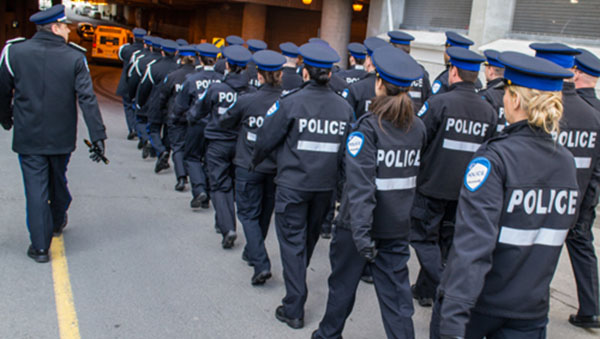By Yvonne Sam
PRIDE Columnist
 The longstanding problem of racial uneasiness, between law enforcement and Blacks in Montreal, has been underscored, in recent months, by continued publicized racial profiling at the hands of representatives of the City of Montreal Police Service (SPVM).
The longstanding problem of racial uneasiness, between law enforcement and Blacks in Montreal, has been underscored, in recent months, by continued publicized racial profiling at the hands of representatives of the City of Montreal Police Service (SPVM).
Such behaviour, usually under extremely questionable circumstances, has given rise to organizations such as Black Lives Matter, whose members are working for accountability on the part of the police, and for prevention of future police-related deaths or injuries, involving African-Canadians.
Needless to say, the police, like all first responders, are under increasing scrutiny, as they face the pressures of law enforcement in potentially dangerous situations. What then is the underlying source of this ongoing problem? Why are Blacks stopped more often than any other racial group? What have the Montreal Police yet to learn or unlearn?
Is the Black community any nearer to finding a solution that would bring some form of inner peace to Blacks — especially when they encounter an arm of the law; are in environments that are not compatible with their social status; or drive vehicles that they are visually deemed incapable of being the owners?
There is a familiar French expression, which when translated, says: the more things change, the more they remain the same. The Black community in Montreal cannot afford to continue to live by that saying, given the present state of affairs between Blacks and the police.
The root of the problem and the unwavering tragedy lies in the way in which heads of all colors avert conversations of institutional and structural racism — our systems and structures – which have historically been proven to be racialized, wrong and broken.
The problem, plain and simple, is our downright denial of the institutional and structural racism around us and our refusal to look at it, understand it and then take action to change it.
Instead, we prefer to believe in our rose-colored-glasses fiction of a post-racial reality, when social indicators, statistics, disparities and everything in this society confirms the opposite.
Our collective progress depends upon us facing and dealing with this reality.
Canada and her provinces are currently convulsing over issues of diversity and race.
Police departments, from Montréal to Toronto and beyond, have looked upon diversity hiring as the antidote to anti-Black police brutality and profiling. Given the diversity of our communities, an issue of importance and concern to all, is the policing of them.
The harbored idea that the present disquiet within the Montreal Police could be contributing to racial profiling, clearly fails the litmus test of reality, in addition to showing elements of asininity.
Quebec’s Public Security Minister, Martin Coiteux, in a remedial effort, has launched an inquiry into what he himself has termed systemic problems within the Montreal police service.
What is happening in the Montreal police service is an outgrowth: a symptom of a larger problem, part and parcel of our Canadian tragedy.
Canada’s tragedy is one of willful denial: denial of the fact that, despite all the progress made, it has not much strayed — culturally — from the roles it designates Blacks in its national narrative and from the way it treats African Canadian citizens.
A recent case at hand involves former Canadian Olympic boxer, Custio Clayton, who claims that he was racially profiled by Montreal police—detained without reason, handcuffed and arrested on suspicion of being a drug trafficker.
According to the victim, he was handcuffed and placed in the police cruiser while his car was searched by the police officer and her colleague. The search revealed nothing and apparently the officer offered an apology for her mistake, but handed him a $63.00 ticket for possessing the incorrect registration papers for the rental car he was driving at the time.
On a more serious side note is the allegation, made again by the victim, that the police officer, on completion of the vehicle search, stated that she had been a member of the force for 20 years, and whenever she had a hunch that someone was in possession of drugs and was searched, the results were always fruitful.
This recent profiling case once again ignites concern about the culture of impunity at the SPVM.
Even in the face of graphic evidence of disparate treatment, Blacks are the recipients of weak apologies and insulting rationales as mitigations for injuries and injustices. It is evident that the banner to protect and serve provides the shield to justify police actions.
The myth persists that a few bad apples carry out racial profiling. However for the peace that is being sought, it is imperative that all police officers behave as they ought.
Yvonne Sam, a retired Head Nurse and Secondary School Teacher, is Vice-president of the Guyana Cultural Association of Montreal. A regular columnist for over two decades with the Montreal Community Contact, her insightful and incursive articles on topics ranging from politics, human rights and immigration, to education and parenting have also appeared in the Huffington Post, Montreal Gazette, XPressbogg and Guyanese OnLine. She is also the recipient of the Governor General of Canada Caring Canadian Citizen Award.
 Pride News Canada's Leader In African Canadian & Caribbean News, Views & Lifestyle
Pride News Canada's Leader In African Canadian & Caribbean News, Views & Lifestyle





